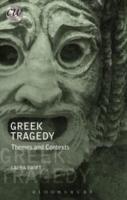
Bloomsbury (2016) p/b 125pp £14.99 (ISBN 9781474236836)
This book is a very useful addition to the Bloomsbury ‘Classical World’ series. It is particularly accessible to the general reader, as well as to its target audience of undergraduates and advanced level school students, and requires no knowledge of the Greek language. S. also provides interest and stimulation for those already familiar with Greek tragedy.
The volume begins with a brief, but apposite, introduction to the context, history, development and conventions of tragedy and how performances were closely linked with public affairs. S. discusses what makes a tragedy, pointing out that Aristotle’s oft-quoted definition, that “… through incidents that arouse pity and fear it brings about the expurgation (catharsis) of such emotions” is actually a riposte to Plato, who believed that tragedy was dangerous because of the powerful emotions it aroused and that it might weaken the audience’s moral fibre. Further context is established by a chapter outlining the life and works of each of the three great tragedians, Aeschylus, Sophocles and Euripides.
S.’s chapter on myth ranges widely. She considers the issue of suspense, or lack of it, quoting from an interview with Alfred Hitchcock to make her point. The Oresteia theme, in particular the Electra story, provides a detailed example of how the tragedians responded differently to well-known myths. The role of the tragic hero is analysed at some length, using diverse examples including Oedipus, Ajax and Hippolytus. S. asserts that the ‘Greeks believed that they (heroes) really did live once upon a time, and that after their death they continued to hold power in the world.’ She concludes that: ‘…part of the success of Greek tragedy is its ability to depict the different aspects of the heroes on stage, their admirable strength and intellect, combined with their disastrous errors.’ In the following chapter on the role of the gods, S. considers the tension between divine and human will. She points out that Euripides’ questioning of the morality of the gods echoes parts of Homer and may not be as radical as has been suggested. Her assertion that ‘Tragedy offers its audience a safe space to explore the difficult truth that life is often unfair, and that bad things happen to good people’ is well made.
S. moves on to a discussion of how tragedy echoed contemporary thought and reflects on its treatment of the concepts of nomos and physis and themes such as the power of rhetoric and attitudes to foreigners. Gender is dealt with along with family relationships, including an interesting excursus on fathers and sons. The final chapter tackles the chorus and includes a detailed analysis of two famous odes: the ‘Ode to Man’ from Sophocles’ Antigone and the ‘Athens’ ode of Euripides’ Medea.
S. remains true to her subtitle of ‘Themes and Contexts’; she does not tell the stories of plays in any detail, but refers to them to illustrate her broader topics. Her arguments are suitably supported by evidence and textual extracts. The appendices include a very useful chronology of the extant tragedies (although excluding the disputed Rhesus and Prometheus Bound), a glossary and a helpful index. This well-written and very readable book will inspire readers to discover or return to the plays themselves and to undertake some further study from the succinct, but pertinent, bibliography.
Marion Gibbs
